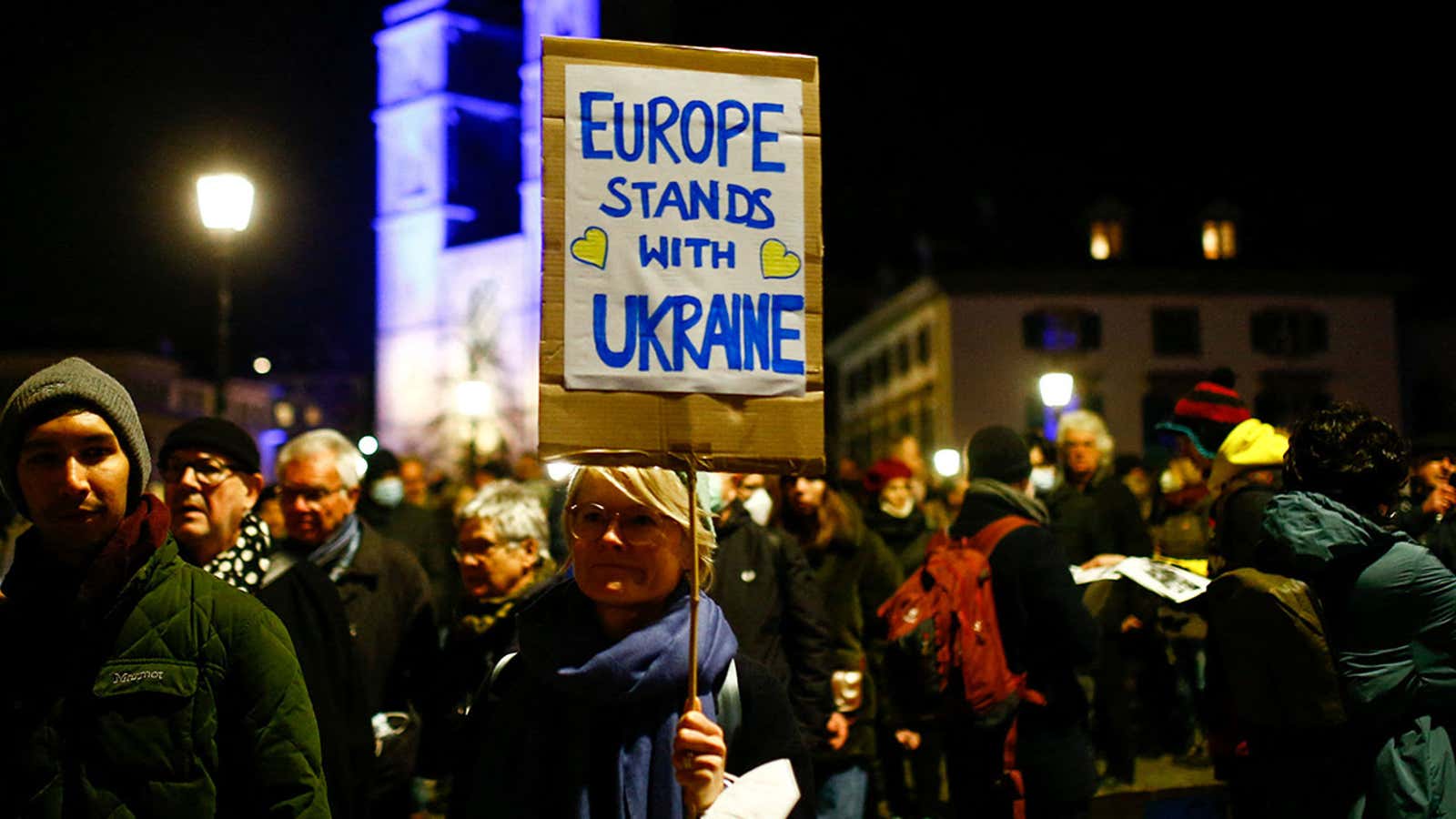As a European, I can’t write this newsletter without dwelling on what’s happening in Ukraine.
At the same time, most of my current work calls for me to concentrate on other things: I’m deep in a long-term project with hard deadlines, which has nothing to do with the military invasion of one of my neighbors.
It strikes me that the disconnect I’m feeling is one that many of us go through: Work needing to continue while something overwhelming boils away in the background. Of course, it’s not always geopolitical. We might be coping with the death of a loved one, or a health problem; we might be spending nights negotiating with a furious teenager, or worrying about a distant parent.
Work, in these times, can be many things: On one hand, an anchor for much of our identity and purpose. On the other, a seemingly pointless collection of tasks.
Whichever it is to you—and perhaps it sometimes seems like both—this emotional see-saw is worth acknowledging. Strong multitaskers that we are, humans are good at performing everyday functions, even while our emotional worlds roil and writhe. But we can’t keep going indefinitely, and we shouldn’t have to do it in silence.
The pandemic has opened up a chink in the facade we formerly had to present—a facade designed to convince the world that work was everything. But when we’re truly rocked by events outside our control, work should help to cushion us. The payoff is that we’ll go over and above when we are no longer depleted. It’s a give and take, not a give, give, give.
All of which brings me back to my job and the writing of this newsletter. Journalism is meant to be one of the things that helps us make sense of what’s going on. But here I am, a journalist, baffled and angry, and so deeply worried about the people being bombed, fighting in the streets, and dying in their own homes. How can we all keep going about our daily work, without doing something? How, on the flipside, can we do anything else? — Cassie Werber, senior reporter
What we’re reading
🎤 A Russian rapper used his work to protest Ukraine. Oxxxymiron told millions of social media followers he couldn’t entertain them while the country was bombing its neighbor.
🎸 And some international artists pulled out of Russian shows. Eric Clapton, Green Day, and Imagine Dragons won’t perform.
💵 Target raised some starting wages to $24 an hour. The hike, from $15 an hour, is one of the latest indications of a tight US labor market.
🎣 Fishing for solutions. This Week’s Quartz Obsession podcast digs into the history of fish sticks, ocean’s little problem-solvers.
📺 A show about corporate misery is cutting close to the bone. Characters in Severance have opted to have their work and personal lives surgically divided from one another in a biting critique of office drone life.
Feedback Loop
Feedback. Positive or constructive. Frequent or rare. Harsh or kind. We know we need it. We often crave it. Without it, we might feel lost or demotivated.
Why is it so hard to get right? From the annual performance review to the weekly check-in, companies have tried all manner of feedback mechanisms. Does your company do it well?
We want to hear from you on the subject of feedback. Write to us. We might use your comments in upcoming reporting.
30-second case study
This week, the Munich Philharmonic sacked its chief conductor Valery Gergiev for refusing to publicly denounce Vladimir Putin’s invasion of Ukraine. A longtime supporter of the Russian president, the 68-year-old stuck to his guns and ignored the Munich mayor’s ultimatum that he should “clearly and indisputably distance himself from the brutal war of assault,” or lose his job.
An internationally-celebrated conductor, Gergiev had been working with the German state-funded orchestra since 2015 and had been an advisor to other international music festivals and ensembles. Gergiev also lost his position as musical director of Switzerland’s Verbier Festival Orchestra and the Edinburgh International Festival; his five-city concert tour with the Vienna Philharmonic was also canceled.
The takeaway: Delving into personal politics at work is murky terrain, but the gravity of the Russia-Ukraine crisis can make things seem more black and white.
In the past, Gergiev’s career flourished despite his loyalty to Putin. He openly supported Russia’s annexation of Crimea and he undermined artists who opposed the Russian president.
Setting aside the weird optics of a Putin supporter directing a state-funded German orchestra, workplace dynamics within the ensemble also hung in the balance. Conductors, in essence, serve as group leaders and trust is eroded when they embrace contentious ideas—no matter how competent they are at their job.
The pressure for leaders to declare their allegiance has played out in recent political upheavals like Black Lives Matter and the #MeToo movement, too. Staying silent or appearing indifferent is no longer an option.
You got The Memo!
Today’s Memo was written by Cassie Werber and Anne Quito. It was edited by Francesca Donner. The Quartz at Work team can be reached at work@qz.com.
Did someone forward you this email? Sign up for future installments here. Get the most out of Quartz by downloading our app and becoming a member.
